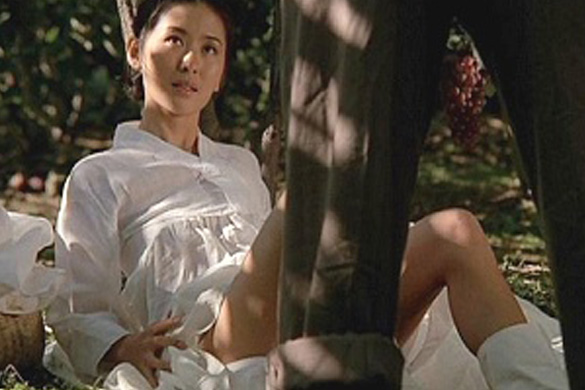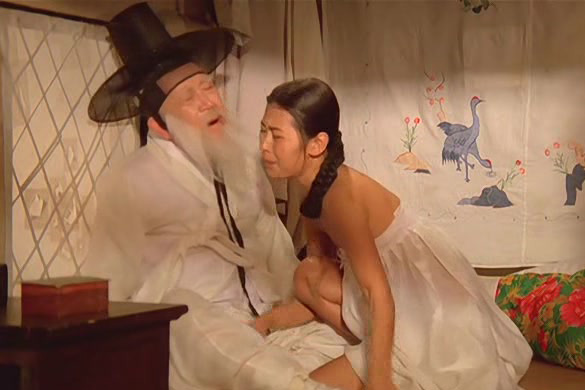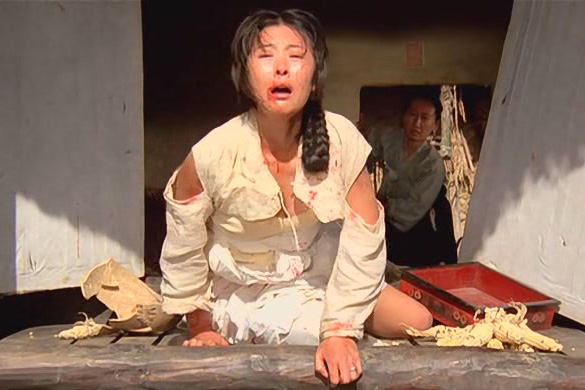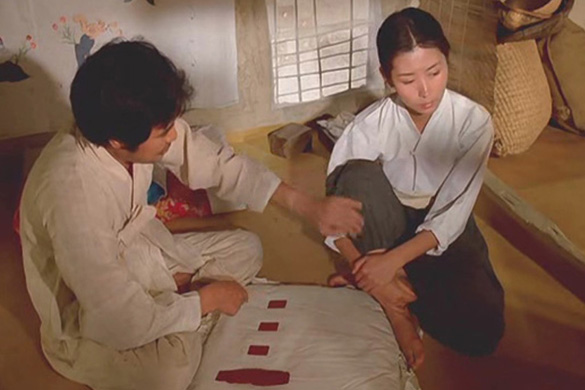"You’re not scared of stealing other women’s husbands, but you’re nervous about taking someone’s mulberry leaves?"
Synopsis:
For the vast majority of her married life, An-hyeop (Lee Mi-sook) has led a largely solitary existence in a small, rural village while her husband Sam-bo (Lee Moo-jeong) almost endlessly travels around Japan-occupied Korea gambling and losing (mostly her) money. In fact, the only reason for Sam-bo’s rare, brief visits to his marital home is to secure more of An-hyeop’s hard-earned cash to fritter away and partake in his conjugal rights. As An-hyeop struggles to make ends meet in her husband’s absence, a female neighbour tells her of a man‘s request to have sex with her in return for a (much needed) sack of rice and financially desperate as An-hyeop is, she agrees.
However, their adulterous dalliance in the woods is spotted by other neighbours and in the blink of an eye word spreads that An-hyeop sells sexual favours to anyone willing to pay. The other women of the village initially find the whole subject rather amusing, stating that “she’s had sex with every man around, apart from our husbands”, but when they realise to their horror that their spouses have almost been at the front of the queue they decide that something drastic – and indeed violent – must be done to bring an end to An-hyeop’s wanton affairs once and for all...
Review:
Lee Doo-yong’s ‘Mulberry’ (based on a short story by Na Do-hyang) begins with a series of visuals accompanied by gentle traditional Korean music showing the seemingly idyllic setting in which An-hyeop lives. In fact, as we are about to find out, the only thing not outwardly blissful or peaceful is An-hyeop herself. As the scene focuses in on our heroine’s home, harmony soon turns to dissonance as we hear her shrill tones berating her errant husband for constantly leaving her alone to (pointlessly, from her point of view) traipse around the country throwing away her hard-earned cash in gambling dens of one sort or another. With this early scene, the humour and it could be said tongue-in-cheek nature of ‘Mulberry’ is clearly on show. While An-hyeop rants her high decibel diatribe without even pause for breath – all the while feverishly completing household chore after household chore at breakneck pace (chores that Sam-bo wouldn’t even consider lowering himself to do), Sam-bo sits silently, unperturbed, happy to let his wife vent spleen knowing full well that once (if ever) she goes silent he’ll get both the sex he wants and the money he needs with just a simple "There, there", regardless of her protestations.
Feel free to call me odd or suspect but there is to my mind something utterly enticing, and indeed humorous, about female Korean film characters verbally 'losing the plot' at length and at the top of their lungs - from Jeon Ji-hyun’s titular Sassy Girl, through Son Ye-jin’s none too subtle efforts (and indeed deeply and hilariously rude gestures) to end the advances of a suitor outside a lift in ‘My Wife Got Married’, to Shim Eun-kyung’s ‘Miss Granny’ character berating anyone who’ll care to listen and even some who don’t... and beyond.
As such, in one fell swoop director Lee Doo-yong manages to underline Mulberry’s duality as deliberate farce and drama at the same time as drawing a distinction between love and sex (An-hyeop acquiesces to her husband’s sexual demands in spite of his constant disappearances, his obvious laziness, his using and his manipulation of her because she clearly loves him at her core, while the sex she has with other men in the village is far more based on ideas of cold commerce and its resultant gain than on feelings, even though she clearly reveals in the knowledge that her beauty and sexiness has every man she crosses paths with desperate to bed her).
It could also be said that ‘Mulberry’ somewhat steps away from the idea, long held and vaulted in classic Korean cinema, that female sexual voracity serves to undermine family and indeed Korean society at large.
Far more, An-hyeop is ultimately the sole victim of her sexual success (if you will) but all the while to a greater extent she still stands as a wife who does whatever she must to survive and secure the future of her family (allowing her husband to carry on the life he chooses, in the process), even if that means indulging in numerous adulterous liaisons for financial gain.
A far cry, to my mind, from the statement screaming from and almost inherent to Golden Age Korean cinema and beyond that any woman - or indeed man - undertaking such actions and giving in to baser instincts will either go mad (’Insect Woman’) or destroy everyone and every relationship with which he/she is associated (‘The Housemaid’).
 |
And while we’re on the subject of themes, implications, inferences and analogies: Her sexual dalliances aside, An-hyeop becomes involved in helping look after some silk worms belonging to a neighbour, tasked with ensuring they have enough mulberry leaves (hence the title of the film) to eat to survive and spin the silk that will bring in a (hoped) fortune, even if An-hyeop must steal the leaves to do so. As Mulberry’s narrative progressed, I could not shake the thought that the silk worms are almost an analogy for An-hyeop’s situation itself, the worms’ survival reliant on the theft of the leaves for their sustenance being rather akin to this often abandoned wife stealing other women’s husbands for sex in return for foodstuffs to see her prosper in her community. That is, at least, until her female neighbours discover the true extent of her illicit sexual encounters.
The relaxation of censorship rules in the years preceding ‘Mulberry’ was utterly vital to its creation as an erotic cinematic drama. However, equally important was the effect that Lee Doo-yong’s film had on Korean cinema as a whole and the emergence and growth of depictions of overt sexuality portrayed in Korean films in the years following. Four years before ‘Mulberry’, Korea’s first erotic film, ‘Madame Aema’, was released. Many, in the years since, have cited the fact that ‘Madame Aema’ was at that time the most sexually explicit Korean film ever made (think sexual content comparable to that found in the ‘Emmanuelle’ series of US films). But ‘Mulberry’, so soon after, frankly wiped the slate clean and took erotic cinematic depictions in a whole new direction and to an entirely new level, while managing to always make it appear as a valid inclusion and never feel simply gratuitous.
‘Mulberry’ took the often previously seen positioning of cameras and props to cover characters’ dignities (if you will) during sexual scenes and pushed this technique just enough to give a true feeling of eroticism (a naked lady behind a covering in previous films, for example, becoming Lee Mi-sook behind a sheer, virtually see through net in ‘Mulberry’; or the focus on the legs and thighs of the main female character in ‘Between the Knees’ (1984) becoming Lee Mi-sook in ‘Mulberry’ wearing a long, flowing traditional garment then turning around to show her buttocks fully exposed for just a moment; etc etc).
Not only that, but ‘Mulberry’ also took the humour of films like ‘Between the Knees’ and used it to allow a greater ramping up of sexual imagery than any wholly serious and melodramatic narrative of the time likely could have.
Case in point, the aforementioned, repeatedly exposed bottom of actress Lee Mi-sook. On numerous occasions in ‘Mulberry’, Lee Mi-sook’s naked derriere takes centre stage when you least expect it to, whether she is straight-faced, facing the camera only to turn around with a split in her dress showing her buttocks protruding as she deliberately wiggles while walking away; or lying face down in bed with the same dress split down the back and her bottom protruding, while a neighbour breaks in to her house to steal her rice before exiting, going to her front door and presenting her with the same rice in payment for sex. Of all the visual eroticism present in ‘Mulberry’, these moments are easily the most humorously memorable, and indeed sensual, and show without a shadow of a doubt that less is most definitely more in terms of sexual imagery on the silver screen.
 |
If any of you happen to question the importance of ‘Mulberry’ to subsequent Korean films over the years and indeed Korean cinema as a whole, I challenge you to sit down and watch Im Sang-soo’s ‘A Good Lawyer’s Wife’. In the scene where Moon So-ri’s character first seduces her young lover, her body positioning on screen, her sexually provocative actions, as well as camera framing and angle almost cannot fail to bring to mind Mulberry’s An-hyeop in her first sexual dalliance in the woods for that huge bag of rice. In fact, the similarities of the scenes (aside from location) are such that you could almost superimpose a screenshot from one on the other. Considering the fact that Im Sang-soo’s films have time and again shown an in-depth knowledge of the history of sexuality in Korean cinema, I would virtually guarantee that if asked he would cite that very section of ‘Mulberry’ as his inspiration for the seduction scene in ‘A Good Lawyer’s Wife’.
As a final note: As previously mentioned, ‘Mulberry’ is based on a short story by Na Do-hyang. However, director Lee Doo-yong’s film differs in several areas, most notably in the appearance of an ever-silent, ever-watchful Japanese soldier (as mentioned by Philip Gowman of London Korean Links on the Hangul Celluloid Facebook page recently). That fact, of course, raises the question of why Lee Doo-yong chose to create and incorporate a completely new character, especially one with such a small, dialogue-free role, but to my mind the answer is fairly simple. Here we have a story that is set in Japan-occupied Korea in the 1920s and as such mention must be made of Korea under Japanese rule while not stepping too far, risking the splintering of narrative/story flow or pulling viewers out of their immersion in An-hyeop’s seductive tale. Our somewhat mysterious Japanese soldier (complete with bicycle) silently follows An-hyeop’s husband wherever he travels but takes no interest in the villagers whatsoever, even utterly ignoring their cries for his help during a violent altercation (obviously relating to An-hyeop’s antics).
As far as I’m concerned, the character of the soldier allows Lee Doo-yong to resolutely state the fact that ordinary Koreans under Japanese rule were left to struggle and survive (or not) with no help at all from the occupying country, no matter how dire their situation became, but should Koreans have attempted to change their simple life of poverty for the better (in this case, Sam-bo in his travels to try to win money gambling) they would instantly come under the intrusive and ever-watchful eyes of a Japan determined to keep them lowly, subservient and lacking a means to escape from occupied oppression.
 |
Summary:
While ‘Mulberry’ came just four years after the hugely famous and indeed infamous ‘Madame Aema’, the marked difference in the handling of the film‘s subject matter, its direction, the level of its sexual content and even the more natural style of acting it contains is noticeable. A simple story concept that uses understated humour to draw audiences into a sumptuously erotic tale that not so long before would have been virtually taboo, ‘Mulberry’ also gives Korean cinema fans the opportunity to watch Lee Mi-sook as a youmg actress and realise that she was every bit as talented all those years ago as she has shown herself to be through her lengthy career to veteran status.
‘Mulberry’ (뽕 / 1986) - Directed by Lee Doo-yong
|





